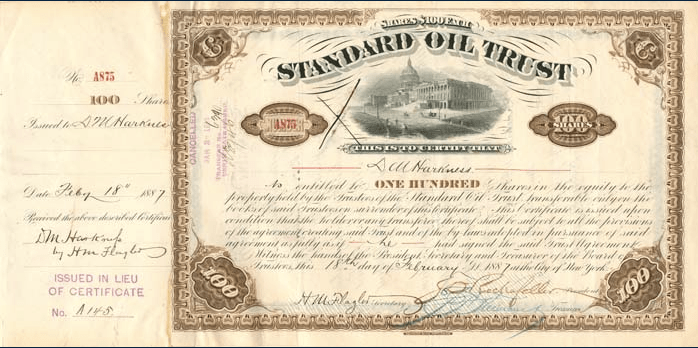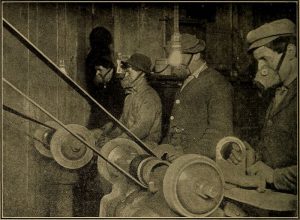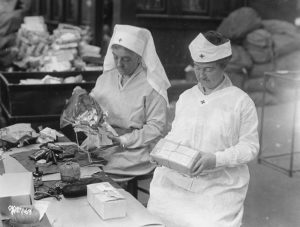Born in 1839, John D. Rockefeller was an American industrialist and philanthropist who built an oil empire by guaranteeing a uniform quality grade for his standard oil. He was one of the richest men in history. Rockefeller’s Standard Oil Company was perhaps one of the most powerful monopoly in America. At the time of his death, his wealth was estimated to be worth over half a-trillion dollars.

At the young age of sixteen, Rockefeller began attending community college. He was a student for three months until he found his first job as a produce clerk at a Cleveland commission firm where Rockefeller was the person who bought and sold commodities for clients for a commission. The firm bought and sold shipped grain, coal, and other raw materials. After three months, he was given a raise and became the cashier and bookkeeper for the firm. 1 At the age of nineteen, in 1859, Rockefeller borrowed money from his father and began his first business venture with Maurice B. Clark. They formed their own commission firm. Clark handled all the work in the field, while Rockefeller managed all of the bookkeeping and bank issues. They experienced great success the first year, bringing in $450,000 from buying and trading farm produce and supplies.2 Within that same year the first refinery was erected in Titusville, Pennsylvania. Cleveland became a refining center for the booming new industry, and in 1863, Rockefeller and Clark entered the oil business as refiners. With Samuel Andrews, who had plenty of experience in refining, joining the business, they now operated an oil refinery as well as the commission business. Within two years Clark was bought out by Rockefeller for $72,000. The new firm was named Rockefeller & Andrew, and promptly their business became Cleveland’s largest refinery.3
Shortly afterwards, Rockefeller partnered with his younger brother William, along with S. V. Harkness and H. M. Flagler, who helped set up favorable freight rates on the railroad. By 1870, the use of kerosene was rapidly spreading for the use of lighting. Rockefeller formed the Standard Oil Company of Ohio and within a year they were a one million dollar corporation making forty percent profit.4 Rockefeller bought out most of Cleveland’s refineries, as well as New York, Pittsburgh and Philadelphia. Rockefeller next turned to new transportation methods: railroads and pipelines. The Pennsylvania Railroad opened up a refinery in an attempt to stop Rockefeller from buying them out. By 1879, Standard Oil became a full industry monopoly by buying out rival refineries and distributing and marketing its products around the world. Standard Oil controlled ninety percent of America’s oil. In 1882, Rockefeller’s properties were combined into the Standard Oil Trust, which ensured that no one would ever be able to buy him out. Standard Oil Trust had an investment of seventy million, and there were forty-two certificate holders, or owners in the trust.5 Rockefeller was a target for muckraking, and people viewed him as greedy and selfish. He was a man who bribed other men to spy on competing companies, or threatened rivals to join the Standard Oil Trust, and he had no problem getting richer by the downfall of other men and their companies.

By 1890, the Ohio Supreme Court dissolved the Standard Oil Trust. However, the business was part of Standard Oil of New Jersey and was considered a holding company. Due to its legal designation it could not be touched. By 1911, after many years of arguing in court, the U.S. Supreme Court ruled that Standard Oil of New Jersey was in violation of the anti-trust laws and forced it to break up into more than thirty individual companies.6 That same year Rockefeller retired from Standard Oil and made a deal with Andrew Carnegie (a Scottish immigrant who made a fortune in the steel industry). Rockefeller sold Carnegie all his investment holdings. In this new role he handled all of Carnegie’s transportation on the Great Lakes. Rockefeller brought in 200 million dollars for the first time.7 In truth, he was not driven solely by profits. Rockefeller became a philanthropist donating to various educational schools, all kinds of religious churches, and scientific causes, and he funded the University of Chicago and the Rockefeller University. The total of Rockefeller’s philanthropies totaled an estimated 900 million dollars.8 He died at the age of ninety-seven, on May 23, 1937.
The impact of Rockefeller and his genius and business acumen are impossible to ignore. He is an icon in America history. In the end, Rockefeller had accomplished his goals. He did not let anything stop him and his ideas from coming to reality. He was a very smart man and used all his knowledge in creating and becoming one of the richest of men, greatest of philanthropists, and a very powerful man. He made a fortune and lived a simple life giving back to society. He made a promise to himself that he would give back ten percent of what he made and he did just that until his death.
- Encyclopedia of World Biography, 1998, s.v. “John Davison Rockefeller.” ↵
- Encyclopedia of World Biography, 1998, s.v. “John Davison Rockefeller.” ↵
- Encyclopedia of World Biography, 1998, s.v. “John Davison Rockefeller.” ↵
- Encyclopedia of World Biography, 1998, s.v. “John Davison Rockefeller.” ↵
- Encyclopedia of World Biography, 1998, s.v. “John Davison Rockefeller.” ↵
- Encyclopedia of World Biography, 1998, s.v. “John Davison Rockefeller.” ↵
- Alan Brinkley, American History: Connecting with the Past Volume 2 (Fifteenth Edition, McGraw-Hill Education, 2014), 464-65. ↵
- Encyclopedia of World Biography, 1998, s.v. “John Davison Rockefeller.” ↵




35 comments
Luis Molina Lucio
It is indeed impressive how Rockefeller started his legacy. To learn the background of successful people is usually very interesting and this article proved that. It is not easy to start something from scratch which is what Rockefeller essentially does. This article is very clear on how Rockefeller was not a perfect holy person but also had his flaws and in order to get where he was, he had to also have some sort of malice (Business wise) when it comes to succeeding. Just a great article and really teaches/ shows who Rockefeller was, you could come in not knowing who Rockefeller was and come out knowing what he did, why he did, where he did and overall, one gets educated on Rockefeller.
Aaron Sandoval
This article was well written and did a good job of covering the life of possibly one of the most influential businessmen in America. The age of the robber barons has always been my favorite period of American history, while not great for all people, it helped shape the future of American economics and how Americans did business. It is difficult to think of America today without thinking of John D. Rockefeller at least for me.
Andrea Degollado
This article was amazing to read and very interesting. John Rockefeller is one of the most power men and founded one of the biggest and most powerful monopolies. I have read alot about him and a lot movies have featured some information about him however this article really allows you to get to know Rockefeller. This article was very informative and extremely well developed. Great article.
Amanda Uribe
Rockefeller and his oil empire was the real start of one of the biggest monopolies America has ever had. Due to the railroads being made and it being one of the biggest innovations of the time he was able to make billions. I was surprised to see that his wealth estimate was over half a trillion. That would be nearly impossible in today’s society because of our laws of monopolies. But he really did give back to the economy and I admire that about him.
Bianca-Rhae Jacquez
This article is amazing and it allows people to get to know John Rockefeller in a deeper level. It is crazy that John Rockefeller was the founder of a powerful monopolies and he was able to become one of the richest man during his time. He was a great business man and never lost sight of what was best for his business.
Christopher Metta Bexar
John Rockefeller is the founder of one a few real monopolies ever created. It is indeed asked if he would in fact be the wealthiest man in the world in the last three centuries (including Jeff Bezos who is the chairman of the world’s first trillion dollar corporation).
As the author tells us Mr Rockefeller made his money his way. I found it interesting to read about one of the greatest of the so called “robber barons” of the 19th century.
Raymond Nash Munoz III
This is a really informative article that provides all the necessary information to get interest of who Rockefeller was. From the article I have gathered that, from a large perspective, Rockefeller seems like a very caring contributor to his society. Though, I can’t help but notice how Rockefeller started his business with Clark, then integrated Andrew, and eventually ditched Clark. I know I don’t have the full story and that there probably is some crucial detail that explains the change of pace, but as of right now, it would seem like Rockefeller’s interest’s changed and they didn’t involve Clark. Even though Rockefeller’s switch up on partners looks like the common negative aspect of business, it still doesn’t erase all the good he had done, he was in fact human.
Valeria Perez
I am divided with this story. In one hand I admire Rockefeller, he started his own business at a young age and dominated market through his skills and leadership. On the other hand, he bullied others and abused the system that had made him his fortune (capitalism). Though he abused his power you still have to admit he was an excellent business man that knew when to get into a business and when to get out.
Ethan Rodriguez
I choose this article to comment on because earlier in my schooling at St. Mary’s University, we talked about Rockefeller and his historical significance in oil. In the core class Others, we talked how impactful Rockefeller was and how he made his fortune in the industry. I feel like this article explained more of the philanthropist side of Rockefeller. I think this article provided me with more of an interesting aspect of that lifestyle, and I feel that through the writing I gained more knowledge. It was a great read.
Max Lerma
This article was a great read. I knew about Rockefeller’s business enterprises, but less about his philanthropic efforts. I am really glad that you brought it up in your article. The fact that he gave ten percent of his profits to charity every year shows that he was not your typical leader of a big business. The way you wrote it too, ensured that your readers never lose interest in what else Rockefeller accomplished in his life.